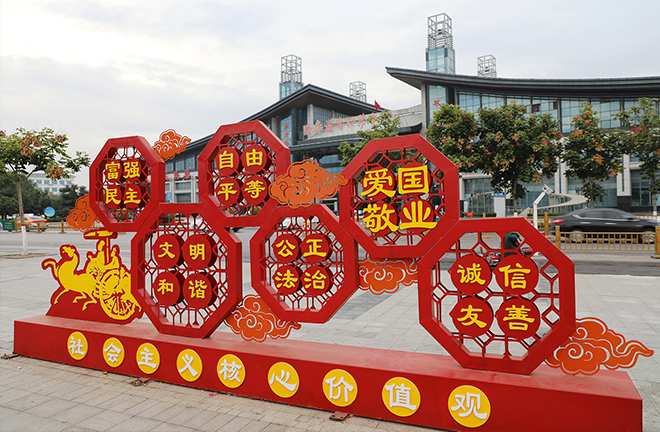Academics shed light on developing socialist culture

Photo taken on Oct. 4 shows a sculpture for the publicity of the core socialist values in Qufu, Ji’ning, Shandong Province. Photo: CFP
Culture is the soul of a country and a people. In his report to the 20th CPC National Congress, Xi Jinping, general secretary of the CPC Central Committee, expounded comprehensively and systematically on “building cultural confidence and strength and securing new successes in developing socialist culture.” Scholars said that this has pointed the direction and provided fundamental guidelines to turn China into a country with a strong socialist culture in the new era on the new journey.
People-centered orientation
A people-centered development philosophy is the foothold and starting point for developing socialist culture. People’s ever-growing needs for a better life include material and non-material needs. According to He Yun’ao, a professor of history at Nanjing University, this people-centered approach is widely reflected in the practices of public culture, cultural industry, cultural tourism, cultural promotion, and the creation of cultural works. Using archaeology as an example, he said that the resources, funds, and findings of archaeological research are all public. Chinese archaeology has achieved globally significant achievements, and its rich outcomes will eventually be accessible to the people.
“On the basis of strengthening basic and professional research, we should properly popularize archaeology, and share our cultural creations, cultural wealth, and cultural wisdom with the general public,” he said. A successful example is the Sanxingdui archaeological excavation carried out in recent years, which has been open to the public through multiple channels.
History is the source of reality and the key to the future. Understanding history is inseparable from archaeology. The construction of archaeology with a Chinese style and Chinese features shows the Chinese nation’s long-lasting cultural genes, and unleashes the intellectual power to realize the great rejuvenation of the Chinese nation. He Yun’ao said that in archaeological practices, creative achievements presented by the time-honored Chinese civilization and rich materials concerning China clearly reveal that the knowledge, discourse, and academic systems of Chinese archaeology will be able to showcase Chinese civilization’s contributions to the world and demonstrate the new atmosphere of vigorous academic development in China only when the systems are distinctively Chinese. Under the guidance of Marxism, it is of great practical significance to deepen the study of Chinese civilization’s characteristics and forms, and to provide theoretical support for the creation of a new form of human advancement, He Yun’ao said.
Core socialist values
According to the report to the 20th CPC National Congress, the core socialist values have immense power to rally the people’s support and pool their strength. The core socialist values comprise a set of moral principles, including prosperity, democracy, civility, harmony, freedom, equality, justice, the rule of law, patriotism, dedication, integrity, and friendliness. Scholars who received interviews from CSST agreed that in order to build cultural confidence and strength, and secure new success in developing socialist culture, the core socialist values must be utilized to cultivate and educate the people, raise public moral standards, enhance public civility, and enhance civility throughout society.
“Cultural confidence and strength are externalized as the promotion of a nation’s image, condensed into the expression of social values, and internalized as individual codes of conduct, which align highly with the core socialist values,” said Fu Caiwu, director of the National Institute of Cultural Development at Wuhan University. The core socialist values specify goals and requirements on the national level, offer value guidance on the social level, and point out the direction for moral cultivation on the individual level. Demonstrating the CPC’s mission for the country to prosper, realize national rejuvenation, and ensure the people’s happiness, the values are the endogenous source and core power for building cultural confidence and strength.
He Yun’ao recommended that interpretation and publicity of the core socialist values should be organically combined with education on patriotism, collectivism and socialism; with the ethos of work, enterprise, dedication, creativity, and frugality; and with China’s rich family-related culture including families themselves, family records, family ancestral temples, family education, and family values, so as to better serve the people, socialism, and modernization.
Better presenting Chinese culture
The Congress report called for deepening exchanges and mutual learning with other civilizations and better presenting Chinese culture to the world. Promoting the international communication of Chinese culture and increasing its international influence is essential to building cultural confidence and strength, and securing new successes in developing socialist culture. He Yun’ao mentioned that the unique knowledge system of Chinese culture contains a profound understanding of the diversity of human civilization and the richness and possibilities of culture.
Zhang Zhiqiang, director of the Institute of Philosophy at the Chinese Academy of Social Sciences, said that the key to extending the reach and appeal of Chinese civilization is to clarify the characteristics and forms of Chinese civilization, and elucidate the internal mechanism of the continuous development of Chinese civilization for more than 5,000 years.
“We must strengthen comprehensive research on Chinese civilization, combine the origins and development of Chinese civilization, and integrate philosophy, history, and other fields of social sciences, while deepening studies of major basic theories and practices by making comparisons with other civilizations in the course of world history, thereby fully demonstrating the spiritual characteristics and profound cultural heritage of Chinese civilization,” Zhang said.
Edited by CHEN MIRONG

 PRINT
PRINT CLOSE
CLOSE